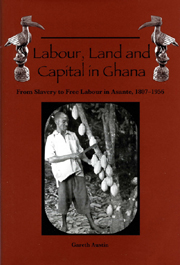
- Publisher:
- Boydell & Brewer
- Online publication date:
- September 2012
- Print publication year:
- 2005
- Online ISBN:
- 9781580466363
- Subjects:
- Area Studies, African Studies, History, African History


An examination of the varied ways, outside and inside markets, in which Asante producers obtained labor, land and capital during the transformative era. This is a study of the changing rules and relationships within which natural, human and man-made resources were mobilized for production during the development of an agricultural export economy in Asante, a major West African kingdom which became, by 1945, the biggest regional contributor to Ghana's status as the world's largest cocoa producer. The period 1807-1956 as a whole was distinguished in Asante history by relatively favorable political conditions for indigenous as well as (during colonial rule) for foreign private enterprise. It saw generally increasing external demands for products that could be produced on Asante land. This book, which fills a major gap in Asante economic history, transcends the traditional divide between studies of precolonial and of twentieth-century African history. It analyses the interaction of coercion and the market in the context of a rich but fragile natural environment, the central process being a transition from slavery and debt-bondage to hired labor and agricultural indebtedness. It contributes to the broad debate about Africa's historic combination of emerging 'capitalist' institutions and persistent 'precapitalist' ones, and tests the major theories of the political economy of institutional change. It is written accessibly for an interdisciplinary readership. Gareth Austin is a lecturer in Economic History, London School of Economics and Political Science, and Joint Editor of the 'Journal of African History'.
Austin's book is a groundbreaking survey of Ghana's economic history, based upon an extraordinarily perceptive case study of Asante. It is painstakingly researched and combines a strong empirical base with highly relevant theoretical considerations of current models of institutional change. He has written what will surely become a classic in the field of African economic development.'
Ivor Wilks
The overwhelming impression left on the reader is one of awe [...]. The readability of the book matches the importance of the arguments made, and it makes without doubt a very substantial contribution to [...] our knowledge about the transformation of slave trade in the economies of (West) Africa in the nineteenth century.'
Source: International Review of Social History
[Austin] is able to familiarize Africanists with important developments in economic history as well as combat the marginalization of African economic history that, like so much in African studies, has fallen victim to a preoccupation with contemporary problems. The result is a work that is as rich and diverse in its offerings as the rain forest environment that it describes.'
Roger Gocking Source: American Historical Review
 Loading metrics...
Loading metrics...
* Views captured on Cambridge Core between #date#. This data will be updated every 24 hours.
Usage data cannot currently be displayed.